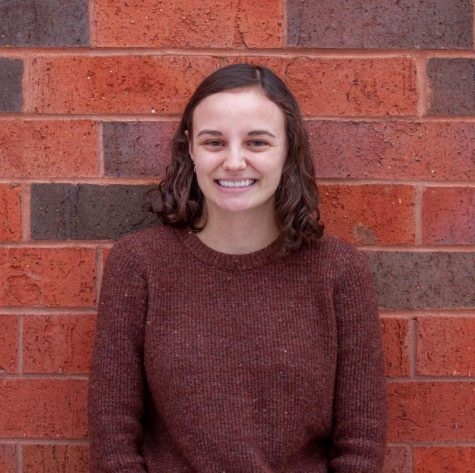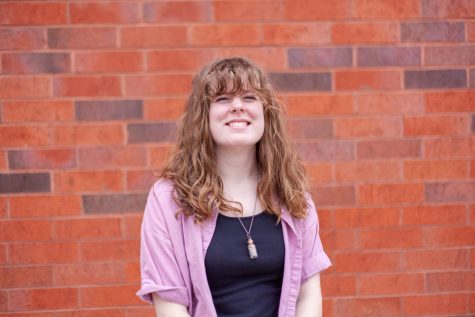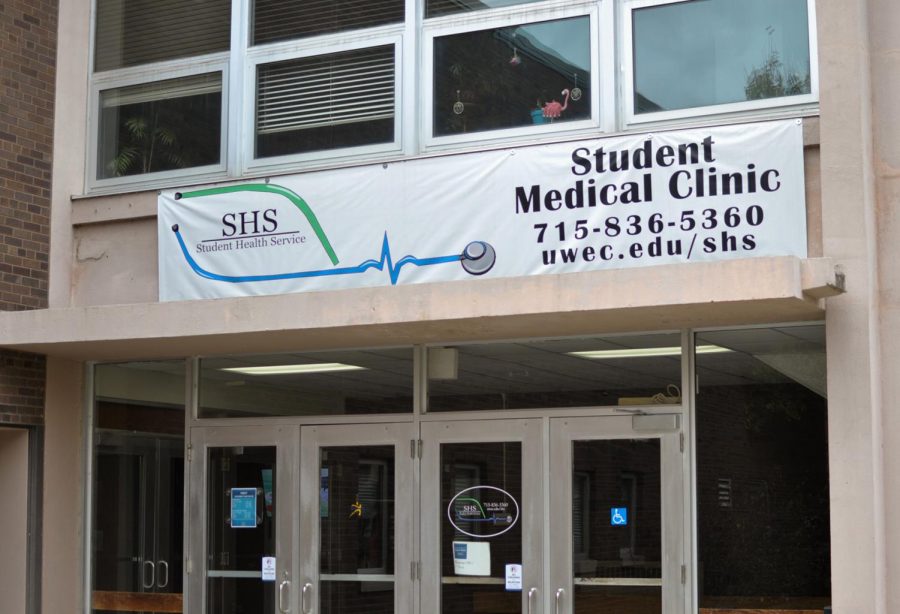‘They’re in short supply and high demand’
Leaders in charge of on-campus testing explain when students can receive COVID-19 tests at Student Health Service
Photo by Alee Erickson
Student Health Service can provide as many as 60 Polymerase Chain Reaction COVID-19 tests in one day, Patricia Kress, a physician and medical director at SHS, said. On weekends, she said they generally can do a little over 40 tests and possibly more depending on how comfortable the staffing is.
UW-Eau Claire students can only get a Polymerase Chain Reaction test at Student Health Service if they are experiencing COVID-19 symptoms or have been in close contact with someone who has tested positive for COVID-19, Patricia Kress, a physician and medical director at SHS, said.
The PCR test given at SHS is where a cotton swab travels “six inches” in through the nose, Jodi Thesing-Ritter, the executive director for diversity and inclusion at UW-Eau Claire, said
A “close contact,” as defined in the Blugold Protocol app, includes the following:
- You were within 6 feet of someone who is infected (with COVID-19) for a total of 15 minutes or more
- You provided care at home to someone who is infected
- You had direct physical contact with the person (hugged or kissed them)
- You shared eating or drinking utensils
- They sneezed, coughed, or somehow got respiratory droplets on you
Kress said, whether masks were worn by the individuals or not, someone is considered a close contact if they were within six feet of a person infected with COVID-19 for a cumulative 15 minutes or more.
If students do not meet these criteria, they cannot be tested for COVID-19 for free, Kress said.
“There is nowhere in this city that you can get tested for free without proper reason,” Kress said. “If you tried to sign up at Prevea, Marshfield or Mayo, they will ask you those questions and if you don’t meet the criteria, they cannot bill COVID funding.”
Kress said most insurance companies will not pay for someone’s COVID-19 test when the person simply wants to know if they have the virus or not since “it’s a $100 check.”
“We don’t have enough tests to do that,” Kress said. “They’re in short supply and high demand.”
Thesing-Ritter said the university is limited by the state in terms of how many PCR COVID-19 tests they get, so they want to reserve them for symptomatic or close-contact students.
Roommates Olivia Lock, a fourth-year secondary education student, and Kendra Holmgren, a fourth-year finance student, said they decided to get tested this week after a third roommate’s test at SHS came back positive.
Lock said the third roommate got tested despite having no symptoms because she had anxiety after being in contact with a person who tested positive for COVID-19 just a week and a half prior.
“We were all shocked that she had COVID and was asymptomatic,” Lock said. “We wouldn’t have known without the test.”
Lock said she called SHS on Tuesday morning and was able to schedule a PCR test appointment for 2:45 p.m. that same day.
“I talked to the receptionist at SHS because the nurses were so busy,” Lock said. “They took my information down and said a nurse would call me back when they had time. An hour or two passed before a nurse called to get back to me — she said she had a stack of students to get through.”
However, just an hour later when Holmgren called SHS, Lock said the receptionist told Holmgren the test appointments were filled until Thursday due to an overflow of students who had come in contact with COVID-19 positive cases.
Holmgren said she didn’t want to wait that long, so half an hour later she instead made an appointment with the Marshfield Clinic Bauman Building.
She said this was frustrating for her.
“It’s disappointing we’re not getting the results and availability that we need,” Holmgren said. “If we don’t feel safe, what’s the point of going to school?”
Lock said she, too, is worried about whether holding in-person classes is a safe choice.
“I messaged kids in classes to say, ‘I’m quarantining, can you send me stuff?’” she said. “And almost everyone said they’re in quarantine due to a roommate or friend having COVID. It’s blowing up, and they can’t keep up, so I just am surprised that our campus is still open, honestly.”
On the other hand, all students who live on campus are required to get an antigen test every three weeks where the “tip” of the swab enters the nose and is swirled around for eight seconds, Thesing-Ritter said.
This test is like a “screener,” Thesing-Ritter said, and according to the Centers for Disease Control and Prevention, these tests are intended to identify people “who are asymptomatic and … may be contagious so that measures can be taken to prevent further transmission.”
Antigen tests get processed in about 30 minutes, Thesing-Ritter said, and if the result is positive, they aim to get the student scheduled for a PCR test on the same day they received their positive antigen test, or if that’s not possible, then the very next day.
As an example of when a student receives a positive antigen test, but cannot get their PCR test until the next day, Thesing-Ritter said there was a student who received a positive antigen test yesterday at 4:30 p.m., but because SHS was closing, the person was instead scheduled for a PCR test at 10:30 a.m. today.
“When you get a positive antigen test, you have to go into isolation until you get your results from the PCR test,” Thesing-Ritter said.
Going into isolation requires on-campus students to go to Putnam Hall while they await their results from the PCR test, Thesing-Ritter said.
“Students in isolation must only leave their room for a medical appointment, and they must wear a mask to go to those appointments,” the SHS website says. “Students who test positive for the virus must remain in isolation and await further guidance from Student Health Service and/or their doctor.”
If a student tests negative on their PCR test, they go from isolation to quarantine, Thesing-Ritter said. According to the SHS website, this means the student “must remain in your room in quarantine for 14 days, and you should only leave your room for a medical appointment.”
For students who are isolating in Putnam and receive a negative PCR test, Thesing-Ritter said they must quarantine in Putnam as well.
Kress said students usually receive their results from a PCR test within 48 hours, but if they have not heard their results after 72 hours, they should contact the clinic.
As of today, Thesing-Ritter said there is no delay or backlog in on-campus testing.
Of the 252 antigen tests that were given yesterday, she said only one antigen test came back positive.
“That means that there’s not a lot of asymptomatic spread,” Thesing-Ritter said. “That means that people aren’t walking around (with COVID-19 and) not knowing and getting other people sick. That’s our goal with the asymptomatic testing.”
Kress said SHS has done as many as 60 PCR tests in one day, but on weekends, they can do a little over 40 and possibly more depending on how comfortable the staffing is.
“We can do three tests in a 15-minute slot because it’s that quick,” Kress said.
However, Kress stressed that PCR tests at SHS are given by appointment only, so it is essential that students call 715-836-5075 or email COVIDinfo@uwec.edu to schedule an appointment.
Van Sistine can be reached at vansistr6741@uwec.edu.
Kopke can be reached at kopkelg3003@uwec.edu.

Ta’Leah Van Sistine is a fourth-year journalism and creative writing student. This is her seventh semester on The Spectator staff. She is spending the semester at Queens College in New York City. When she is not reporting for The Spectator or Blugold Radio Sunday, she enjoys getting lost in a good book or a national park.

Lea Kopke is a fourth-year journalism and German student. This is her seventh semester on The Spectator staff. She plays the clarinet in the Blugold Marching Band and recently relearned how to ride a bike with no hands.


